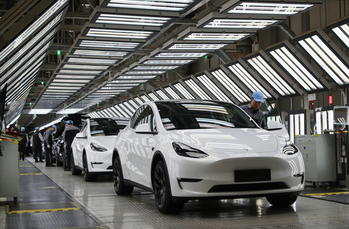
KOREA'S EV IMPORTS FROM CHINA HIT ALL-TIME HIGH
Employees work at the Tesla Gigafactory in Shanghai, China. [XINHUA/YONHAP]
China-made electric vehicles are slowly conquering Korean roads with a massive influx of Shanghai-made Teslas and electric buses.
Korea’s pure EV imports rose 13.5 percent to $1.29 billion this year through the end of July, and, of them, 65.8 percent, or $848 million, were from China, according to data from the Ministry of Trade, Industry and Energy and Korea International Trade Association (KITA).
That's a 766.8 percent surge from the same period last year. It already surpassed last year's full-year figure, which stood at $590 million.
China knocked Germany into second place, with imports slashed 37.7 percent to $338 million. The United States ranked third with $44 million followed by Britain at $23 million.
China's emergence as an EV juggernaut in the Korean market was heavily bolstered by Shanghai-made Teslas.
Tesla launched Model 3s and Ys at sharply cut prices in the domestic market, equipped with Chinese cheaper lithium iron phosphate (LFP) batteries and manufactured in China.
Tesla's EV sales in Korea soared 365.7 percent to 17,380 EVs in the Korean market in the first half of 2024, becoming the largest EV maker. Of them, 98 percent were the Shanghai-made Model Ys and Model 3s, according to data from market tracker CarIsYou.
The Model Y was the best-selling electric vehicle, with a total of 10,041 units sold during the period, up 395.4 percent on year.
Electric buses also played a key role. Chinese buses held 40.7 percent of the market share in Korea's eclectic bus market, rapidly chasing domestically developed buses that had 59.3 percent.
BYD, a Shenzhen-based EV maker, is slated to make its debut in Korea within the year with three possible lineups including the Seal sedan and the Dolphin small SUV.
The arrival of China's low-priced EVs is shaking up the global auto industry. Around 65 percent of EV sales in global markets in the fourth quarter of 2023 were China-made EVs, according to data from KITA.
BYD was the No. 1 brand with a 20.2 percent market share through the end of April, beating Tesla with 11.3 percent.
Korean electric vehicles are losing share to Chinese players in the cutthroat price war while they persist in using pricier high-nickel batteries rather than LFP batteries.
Of all EV sales in global markets, excluding China, in the first half, Korean brands' EV sales accounted for 9.6 percent compared to 13.6 percent in 2018. During the same period, Chinese brands' share rose to 16.3 percent from 3.3 percent.
“Korea-made EVs inevitably fall behind in the price competition with China in both domestic and overseas markets,” said Cho Chuel, a researcher at the Korea Institute for Industrial Economics & Trade.
“Even so, Korea is not in the position that we can impose strict tariffs on China like the United States,” Cho said. “Fundamental means to secure price competitiveness, such as a change in production method or efficiency of supply chain.”
The Office of the United States Trade Representative announced that its tax rate on Chinese EVs would quadruple from 25 percent to 100 percent starting from Sept. 27. Canada also said it would impose a 100 percent tariff on imports of Chinese electric vehicles.
The European Union is scheduled to have a vote with 27 member states on Sept. 25 to decide whether to sustain the new tariffs on Chinese EVs aiming to quadruple from 25 percent to 100 percent over the next five years.
BY NA SANG-HYEON, SARAH CHEA [[email protected]]
2024-09-19T09:17:40Z dg43tfdfdgfd